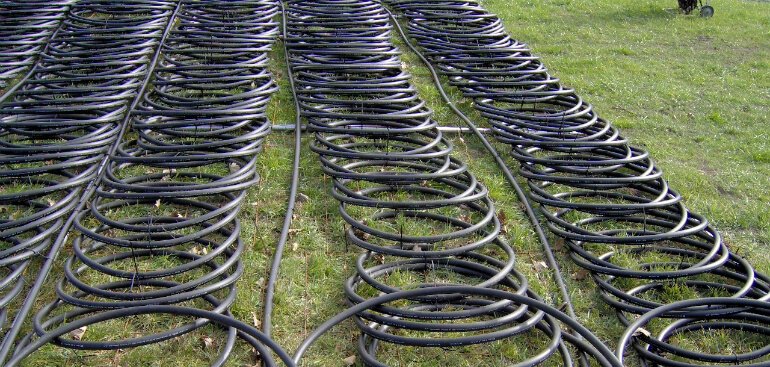Answer these simple questions and we will find you the BEST prices
Which type of solar quotes do you need?
It only takes 30 seconds
100% free with no obligation

Get up to 4 quotes by filling in only 1 quick form

Install a heat pump for less with the BUS grant

We’ve helped over 500,000 homeowners reduce their carbon footprint
- GreenMatch
- Ground Source Heat Pumps
- Ground Source Heat Pump Antifreeze
Ground Source Heat Pump Antifreeze
Why use antifreezes for a ground source heat pump?
Even though the ground source heat pump loops (heat collectors) are laid underground, they still have to be protected from low temperatures. Burying collector pipes deeper in the ground won’t prevent them from freezing, even when they are installed above or below the frontline. Whether its a horizontal system or vertical system with a geothermal borehole, the freezing of a geothermal pump loop is caused by the pump itself, precisely, by the heat transfer principle employed in a heat pump.
As the ground source heat pump constantly removes the accumulated heat, the smaller and shorter a loop, the longer time it requires to absorb new quantities of heat, hence its susceptibility to freezing. This drawback can be overcome by installing bigger tubes, that should prevent the fluid’s temperature dropping below the freezing point. However, bigger tubes mean more pipelines (in some cases, up to 3 times more), which can strain your budget and subsequently, lengthen the payback period.
Thus, an antifreeze liquid is used in most of the ground source heat pump loops, so as to make sure that the coolant can easily flow even below 0 °C. In the following lines we present five antifreeze types that can be used for underground heat collectors.
Keep in mind that these technical solutions help prevent freezing but can also drive up installation expenses. That’s why the ground source heat pump cost in the UK can vary widely, depending on system design and site conditions.
Looking at the ground source heat pump's advantages and disadvantages can be a good starting point to understand the implications of choosing this type of heat pump for your home. Nevertheless, it is still highly recommended to consult a professional in the field.
Has this sparked your interest in ground source heat pumps? Luckily for you GreenMatch is here to help! By simply completing the form below, we'll provide you with up to 4 quotes from qualified installers available in your area. This way you won't waste hours of your time researching and you can objectively compare quotes side by side. Our service is completely voluntary and free of charge.
- Quotes from local engineers
- Payment by finance available
- Save £7,500 with BUS grant
It only takes 30 seconds



Ground source heat pump antifreeze types
- Methanol (methyl alcohol, wood alcohol). Since methanol bears high toxicity levels, its application in ground source heat pumps is strictly regulated. In certain countries it is against the law to use methanol for underground heat collectors, if these are buried deeper than 5 metres. Such a precaution is due to the risks associated with the methanol leakage, that under certain conditions could lead to groundwater contamination. In addition to this, methanol is a highly flammable substance that is prone to explosion, if misused. Thus, due to its somewhat ‘unstable nature’ we would advise to refrain from using methanol in favor of more chemically stable and environmentally friendly options like the ones we cover in the next lines.
- Ethanol (ethyl alcohol, denatured alcohol). Although not as toxic as methanol (if it is pure ethanol), it is still highly flammable and can lead to explosions and asphyxiation. Nevertheless, as an antifreeze it is similar to the methanol heat transfer properties. It flows properly, it is a good heat exchanger, and can stay in a liquid state as long as the temperatures don’t drop below the -9,4 °C mark. However. since it would be expensive to use pure ethanol as antifreeze, the denatured ethanol is used instead. Many of the denaturing agents are toxic and harmful to the underground pipes. The ethanol that is denatured using petroleum based products for instance, can dissolve most of the piping. Still, there are antifreeze manufacturers that are developing ethanol antifreeze liquids that are safe for earth loops, but nevertheless, harmful to people.

- Ethylene Glycol, otherwise known as the ‘car antifreeze’, is a very poisonous substance. On top of being a poor heat transfer agent, it flows badly at temperatures below 0 degrees Centigrade (Celsius). In some countries this type of antifreeze is banned due to the risks of contaminating groundwater sources. Therefore, we strongly recommend avoiding the use of ethylene glycol.
- Propylene Glycol. In contrast to the already mentioned antifreeze fluids, the propylene glycol has low toxicity levels and is generally considered safe. Nonetheless, its viscosity at certain temperatures might limit its application in some of the ground source heat pump loops. Thus, it is important to undertake a careful planning before installing underground heat collectors, especially if you will be using propylene glycol as antifreeze. It is also important to remember that propylene glycol is toxic for animals, specifically cats - hence, make sure to keep your antifreeze sealed and away from kids and pets.
- Calcium Chloride is a decent antifreeze that bears good heat transfer properties, flows well and is not as toxic as the other antifreezes. However, it is very corrosive, which makes its use quite problematic if certain measures are not considered. If calcium chloride is used as antifreeze, then one has to make sure that all metal fittings and pipes are made of brass, the ground source heat pump’s heat exchanger is made of cupro-nickel and other pump’s components that can be susceptible to corrosion are covered with protective layers.
Before deciding on the antifreeze type that would be appropriate for your heat pump, it is important to get in touch with local and/or regional regulatory agencies that oversee the approvement of groundworks in your area. In so doing, you’ll make sure that you are authorized to carry out the planned installation works and that the antifreeze you will use meets the safety and environment protection requirements.
Get Quotes on Ground Source Heat Pumps!
If you have decided to purchase a heat pump, but you are not sure which type you would like, we are ready to help you. Fill out the form below with your personal preferences and information, and we will provide you with up to 4 different quotes from our trusted suppliers of heat pumps. You are free to choose the offer that best suits your needs. The service is free, without obligation, and takes only a few minutes.
- Quotes from local engineers
- Payment by finance available
- Save £7,500 with BUS grant
It only takes 30 seconds



We strive to connect our customers with the right product and supplier. Would you like to be part of GreenMatch?




